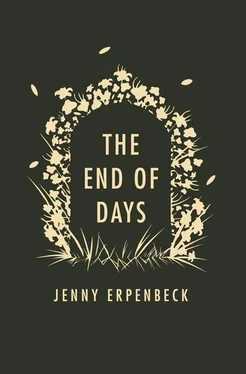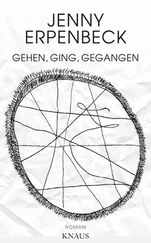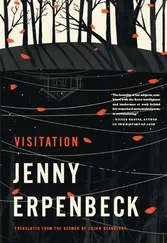Jenny Erpenbeck - The End of Days
Здесь есть возможность читать онлайн «Jenny Erpenbeck - The End of Days» весь текст электронной книги совершенно бесплатно (целиком полную версию без сокращений). В некоторых случаях можно слушать аудио, скачать через торрент в формате fb2 и присутствует краткое содержание. Год выпуска: 2014, Издательство: New Directions Publishing, Жанр: Современная проза, на английском языке. Описание произведения, (предисловие) а так же отзывы посетителей доступны на портале библиотеки ЛибКат.
- Название:The End of Days
- Автор:
- Издательство:New Directions Publishing
- Жанр:
- Год:2014
- ISBN:нет данных
- Рейтинг книги:4 / 5. Голосов: 1
-
Избранное:Добавить в избранное
- Отзывы:
-
Ваша оценка:
- 80
- 1
- 2
- 3
- 4
- 5
The End of Days: краткое содержание, описание и аннотация
Предлагаем к чтению аннотацию, описание, краткое содержание или предисловие (зависит от того, что написал сам автор книги «The End of Days»). Если вы не нашли необходимую информацию о книге — напишите в комментариях, мы постараемся отыскать её.
The End of Days — читать онлайн бесплатно полную книгу (весь текст) целиком
Ниже представлен текст книги, разбитый по страницам. Система сохранения места последней прочитанной страницы, позволяет с удобством читать онлайн бесплатно книгу «The End of Days», без необходимости каждый раз заново искать на чём Вы остановились. Поставьте закладку, и сможете в любой момент перейти на страницу, на которой закончили чтение.
Интервал:
Закладка:
Jenny Erpenbeck
The End of Days
We left from here for Marienbad only last summer.
And now — where will we be going now?
— W. G. Sebald, AusterlitzBOOK I
1
The Lord gave, and the Lord took away, her grandmother said to her at the edge of the grave. But that wasn’t right, because the Lord had taken away much more than had been there to start with, and everything her child might have become was now lying there at the bottom of the pit, waiting to be covered up. Three handfuls of dirt, and the little girl running off to school with her satchel on her back now lay there in the ground, her satchel bouncing up and down as she runs ever farther; three handfuls of dirt, and the ten-year-old playing the piano with pale fingers lay there; three handfuls, and the adolescent girl whose bright coppery hair men turn to stare at as she passes was interred; three handfuls tossed down into the grave, and now even the grown woman who would have come to her aid when she herself had begun to move slowly, taking some task out of her hands with the words: oh, Mother — she too was slowly being suffocated by the dirt falling into her mouth. Beneath three handfuls of dirt, an old woman lay there in the grave: a woman who herself had begun to move slowly, one to whom another young woman, or a son, at times might have said: oh, Mother — now she, too, was waiting to have dirt thrown on top of her until eventually the grave would be full again, in fact even a bit fuller than full, since after all the mound of earth on a grave is always round on top because of the body underneath, even if the body lies far below the surface where no one can see. The body of an infant that has died unexpectedly produces hardly any roundness at all. But really the mound ought to be as huge as the Alps, she thinks, even though she’s never seen the Alps with her own eyes.
She sits on the very same footstool she always used to sit on as a child when her grandmother was telling stories. This footstool was the one thing she asked for when her grandmother offered to give her something for her new home. She sits in the hallway on this footstool, leaning against the wall, her eyes closed, not touching the food and drink a friend has set before her. For seven days she will sit like this. Her husband tried to pull her to her feet, but he couldn’t manage it against her will. When the door clicked shut behind him, she was glad. Just this past Friday, the infant’s great-grandmother had stroked the sleeping child’s head, calling her meydele , little girl. She herself, by giving birth to the child, had turned her grandmother into a great-grandmother and her mother into a grandmother, but now all these transformations have been reversed. The day before yesterday, her mother — who at the time could still be called a grandmother — had brought a woolen blanket for her to wrap herself in when she went walking in the park with her baby on cold days. Then, in the middle of the night, her husband had shouted at her to do something. But she hadn’t known what to do in a situation like this. After his shouting, and after the few minutes in the middle of the night when she hadn’t known what to do, after the moment when her husband, too, hadn’t known what to do, he had not spoken another word to her. In her distress, she’d run to her mother (who now was no longer a grandmother), and her mother had told her to go back home and wait, she would send help. While her husband was pacing up and down the living room, she hadn’t dared to touch her child again. She had carried all the buckets of water out of the house and emptied them, had draped a sheet over the hallway mirror, flung open the windows in the room where the child lay, to let the night in, and then sat down beside the cradle. With these gestures she had called to mind that part of life inhabited by human beings. But what had happened right here in her own home, not quite one hour before, was something no human hand could grasp.
That’s just how it had been when her child was born, not even eight months before. After a night, a day, and another night during which the child hadn’t arrived, she had wanted to die. That’s how far she had withdrawn from life during those hours: from her husband, who was waiting outside; from her mother, who sat on a chair in the corner of the room; from the midwife, who was fussing about with bowls of water and towels; and above all, from this child that supposedly was there inside her but had wedged itself into invisibility. In the morning, after the birth, she watched from her bed as everyone simply went about doing what was needed: Her mother, who had now been transformed into a grandmother, received a friend arriving to offer congratulations, and her grandmother, now transformed into a great-grandmother, brought amulets printed with Psalm 21 to hang around the room and a cake fresh from the oven, and her husband had gone to the inn to drink the child’s health. She herself was holding the baby in her arms, and the baby was wearing the linens that she, her mother and her grandmother had embroidered in the months preceding the birth.
There were even rules for what was happening now. The people her mother had sent arrived at dawn, took the baby from its cradle, wrapped it in a cloth, and laid it on a large bier. The bundle was so small and light that one of them had to hold it in place as they descended the stairs, otherwise it would have rolled off. Zay moykhl un fal mir mayne trep nit arunter . Do me a favor, don’t go falling down the stairs. A favor. She knew the baby had to be buried before the day was out.
*
Now she sits here on this little wooden footstool that her grandmother gave her on her wedding day, she sits with her eyes closed, just as she has seen others sitting in times of mourning. Sometimes it was she who brought food to mourners; now a girlfriend has set bowls of food at her feet. Just as she emptied out all the water in the house the night before — they say the Angel of Death would wash his sword in it — just as she covered the mirrors and opened the window because she’d seen others do so before her (but also so the child’s soul wouldn’t turn back, so it would fly off forever) — in just this way she will now sit here for seven days: because she has seen others sitting like this, but also because she wouldn’t know where else to go while she is refusing to enter that inhuman place her child’s room became last night. The customs of man are like footholds carved into inhumanity, she thinks, something a person who’s been shipwrecked can clutch at to pull himself up, and nothing more. How much better it would be, she thinks, if the world were ruled by chance and not a God.
Maybe the blanket was too thick, that could have been the cause. Or because the baby was sleeping on its back. Maybe it choked. Or it was sick and no one knew. Or the reason was that you could hardly hear the baby crying through the closed doors. She hears her mother’s footsteps in the baby’s room and knows what she is doing: She is taking the blankets out of the cradle and pulling off the pillowcases, she is stripping the cradle’s fabric canopy from its wooden frame and pushing the cradle into a corner. With an armful of bed linens, she now emerges from the room, passing the footstool where her daughter is sitting with her eyes shut, and carries everything down to the laundry. Was it that she’d been too young to know what to do? Her mother never told her about all these things. Or because her husband was equally helpless. Because in truth she had been left all on her own with this child, this creature that had to be kept alive. Because no one had told her beforehand that life does not work like a machine.
Читать дальшеИнтервал:
Закладка:
Похожие книги на «The End of Days»
Представляем Вашему вниманию похожие книги на «The End of Days» списком для выбора. Мы отобрали схожую по названию и смыслу литературу в надежде предоставить читателям больше вариантов отыскать новые, интересные, ещё непрочитанные произведения.
Обсуждение, отзывы о книге «The End of Days» и просто собственные мнения читателей. Оставьте ваши комментарии, напишите, что Вы думаете о произведении, его смысле или главных героях. Укажите что конкретно понравилось, а что нет, и почему Вы так считаете.












